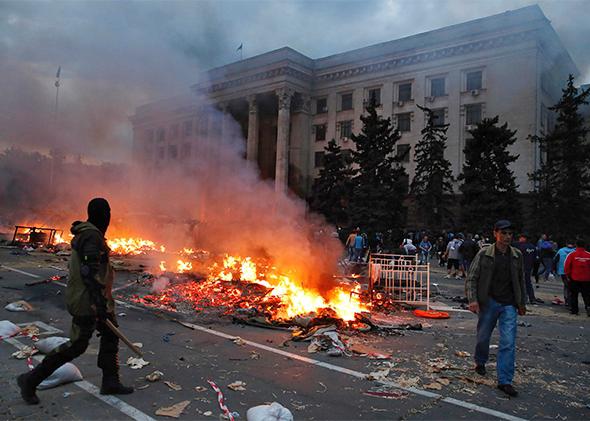At this stage of the Ukraine crisis, the key thing for the West to do is to focus mainly on Ukraine.
Yes, the crisis is about more than just Ukraine. It’s also about containing Russia’s new flirtation with empire, demonstrating America’s reliability as an ally, preserving the principle of secure borders, and shaping the future of Europe. The combination of all these factors is what makes it such a major crisis. But the crisis won’t be resolved by imposing more sanctions on Russia (they won’t affect Kremlin policy in the short term) or by bellowing that the standoff marks the start of Cold War II (such rhetoric exaggerates Russia’s power, alienates allies, and suggests warlike policies that no one wants to adopt).
The solution to this crisis, in all its dimensions, lies in stabilizing Ukraine. And that requires putting enormous effort into something that has received oddly little attention, at least in public accounts of the Western response—ensuring that Ukraine’s May 25 elections are held across the country and are perceived as legitimate.
These elections, whatever their outcome, are central to resolving the crisis. The problem is that as long as ethnic-Russian militias wreak havoc and occupy government buildings in Ukraine’s eastern districts, elections in those areas will be very hard to pull off. This may be one reason why Russian President Vladimir Putin is encouraging—or at least doing nothing to discourage—the violent rebellions against Ukraine’s central authorities. He doesn’t want elections to be held nationwide; he doesn’t want the crisis to be settled—not if the settlement might involve the election of a new government that drifts toward the West’s European Union and away from Moscow’s long-standing dominance.
Putin insists in public that he has no control over these militants, though he adds that he’s concerned about their safety in clashes with the armed forces of the Ukrainian government, which he and his spokesmen have denounced as “illegal” and rife with “Nazis.” (This concern has ominous overtones because similar statements preceded Putin’s annexation of Crimea.)
So we need to put Putin to the test—and by “we,” I mean the Obama administration, the United Nations, the EU, the Organization for Security and Co-operation in Europe: every government and international body with an interest in what’s at stake. Officials say much is going on to help the Ukrainians get this right (though too little is being said about it): registering voters, distributing ballots, setting up polling sites and monitors. But ultimately, it will require Russia’s—which is to say Putin’s—cooperation.
For this reason, it’s vital not to impose the next round of sanctions against Putin’s cronies or certain sectors of Russia’s economy—at least not between now and May 25. It may be useful to go further and make it clear to Russian officials that full cooperation on the elections will result in the indefinite delay of additional sanctions and that, if the election results are respected and Russian troops are genuinely pulled back from the border, some of the existing sanctions could be suspended. Sanctions are supposed to punish bad behavior. If that’s the case, they should be relieved, to some extent, to reward good behavior; otherwise, they’re empty theater. One key to solving the crisis is to calm down and normalize politics in Ukraine, if possible—not to turn the terrain into a battlefield.
A few things are worth keeping in mind. First, elections alone rarely solve a country’s most acute political problems, especially where the country—like Ukraine—has a dearth of democratic traditions and institutions. Second, if the Ukrainian elections come off across the country and Western-leaning candidates win a majority in parliament, no one should expect the new government to join the EU in a flash. Timothy Garton Ash, the most astute and supportive chronicler of democratic movements in Eastern Europe, wrote in February that the most hopeful scenario envisions Ukraine gradually embedding itself in the EU while retaining ties to Russia. No Russian leader, least of all someone with Putin’s background, is going to stand by while Ukraine leaps out of Moscow’s orbit. Anyone who believes otherwise knows nothing about power politics or the history of Slavic nations.
Of course, Putin may ignore our diplomatic efforts and let chaos flourish across his border, seeing it as preferable to an order that endangers his sense of Russian interests. In that case, an intense and public focus on the elections, over these next 10 days, will expose his true motives and interests, and afterward he will have a harder time condemning the elections as illegitimate on the grounds that Western-backed Nazis blocked the attempts of ethnic Russians to exercise their franchise. He might make the claim anyway, without caring that most of the world knows he’s lying, but sometimes such displays have a clarifying effect. Obama would have a compelling case, in its aftermath, for expanding and deepening the sanctions and isolating Putin’s Russia further. And maybe those Western nations most reluctant to take more steps at the moment will feel emboldened to go along.
